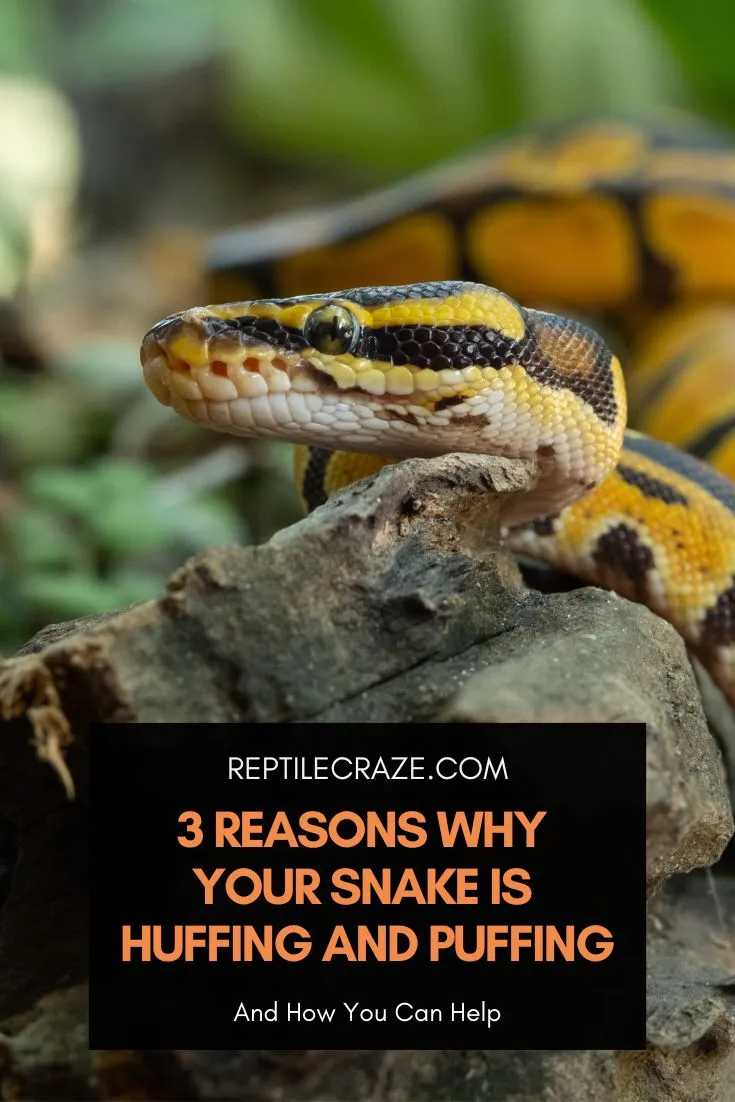
We all know that snakes hiss, but what about huffing? Can a snake huff? Some owners report that their snakes make a huffing or puffing noise at times like they’re rapidly expelling air out their noses.
Some even say it’s the equivalent of a frustrated sigh in humans! But why is my snake huffing, and do all snakes do it?
Snakes can exhibit “huffing” for the following reasons:
- Annoyance or frustration
- Exertion from physical activity or feeding
- Respiratory infection
Some of these are normal and do not require intervention, but others can be a sign of issues with husbandry or health.
For more details, keep reading! I’ll review each of these bullet points with more information, including when to intervene. I’ll also discuss whether or not all snakes huff and which snakes seem to huff the most!
Table of Contents
1. Annoyance or frustration
Many snake owners report that their snakes will huff when they’re frustrated or annoyed. Though captive-bred snakes are typically accustomed to humans and used to handling, there can still be times when this will make them uncomfortable.
Under these circumstances, the huffing noise is almost akin to a hiss—the snake is communicating that it doesn’t like what you’re doing and wants to be left alone!
When can a snake become annoyed?
A pet snake can become annoyed for several reasons, especially with overhandling or handling during times of stress for the snake. So if your snake huffs at you, it’s a good idea to let them be!
The conditions that will annoy a snake and cause it to become stressed will, of course, vary from snake to snake, but here are several instances that could lead to a frustrated huff from your pet:
- Overhandling. Captive-bred snakes are accustomed to humans, but every animal has their limit. Some snake owners report their snake huffed during handling, which is a good indicator that they are frustrated or stressed.
- During a shed. When a snake is shedding, they may feel something is “off”, and their anxiety levels typically increase. Additionally, they can’t see as well, which puts them a bit more on edge. Interacting with your snake during a shed can startle them, leading to a stressed huff.
- While digesting. Snakes take a long time to digest their large, infrequent meals. After eating, they usually prefer to be alone, and interacting with your snake shortly after a meal may cause them to give you an annoyed huff.
It’s abnormal for your snake to huff or hiss very often. If you notice your snake is huffing a lot while in its enclosure or otherwise appears agitated, you may need to make changes to your snake enclosure.
Tip: For more information, check out our article on how to tell if your snake is stressed.
2. Exertion from physical activity or eating
When snakes are particularly active, their breathing can become more apparent.
If your snake has just physically exerted itself, seeing noticeable, heavier breaths isn’t something to worry about immediately—a gasping or clicking noise is expected.
However, your snake’s breathing should normalize after physical activity.
Additionally, when snakes eat a large meal, their glottis extends out of their mouth so they can continue breathing while swallowing.
Sometimes, exhaling through the glottis (also used to create a hiss) can sound louder than usual.
Some snake owners report that their snake huffs and puffs while eating, but many consider this normal due to the snake’s anatomy and the need to breathe “around” their prey!
3. Respiratory Infection
It’s normal to be concerned when your snake makes a strange noise—in fact, it’s essential to keep an eye on these things!
Though the causes I’ve discussed so far are typically nothing to worry about, a respiratory infection needs medical intervention from a reptile veterinarian.
How can you tell if your snake has a respiratory infection? Huffing or labored breathing is one sign, along with open mouth breathing, discharge or mucus from the nostrils or mouth, a gurgling sound while breathing, wheezing, lethargy, and loss of appetite.
If you notice any of these signs and suspect your snake is suffering from a respiratory infection, seek medical attention from your veterinarian.
The snake below suffered from a respiratory infection and needed treatment. If you turn the volume up, you can hear the snake making unusual breathing sounds.
Do some snakes huff more often than others?
Based on our research and experience, ball pythons tend to be the biggest culprit when it comes to huffing. They tend not to hiss often, so the frustrated huff may be the best thing they’ve got!
No matter the breed, observing and interpreting your snake’s behavior and body language is essential to provide them with stress-free handling and husbandry.
- Enchi Ball Python: A Unique and Stunning Morph of Python regius - March 27, 2025
- Emerald Tree Monitor: The Enigmatic Green Guardian of the Rainforest - March 26, 2025
- The Egyptian Cobra (Naja haje): A Fascinating Serpent - March 25, 2025
